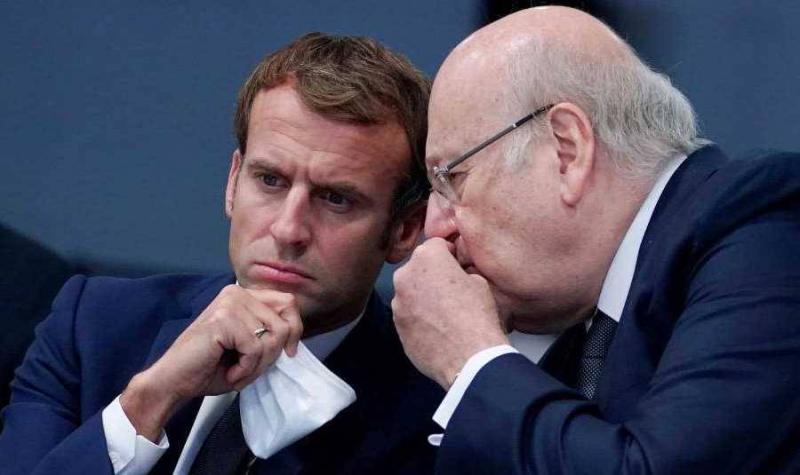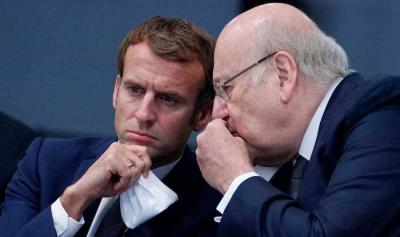Lebanese concerns regarding Israel potentially expanding its military response to include southern Lebanon in retaliation for the Iranian attack on it are at the forefront of the agenda for today’s scheduled meeting in Paris between caretaker Prime Minister Najib Mikati and French President Emmanuel Macron. This comes in light of heightened fears among several European nations, whose ambassadors in Lebanon have warned against the escalation of hostilities between Hezbollah and Israel, which have surged in recent hours to an unprecedented level that could spiral out of control if Israel's response to the Iranian attack extends to the Lebanese-Israeli border.
Political sources revealed to "Asharq Al-Awsat" that the possibility of Israel extending its retaliation to southern Lebanon must be taken into account. They stated that this likelihood is not baseless but stems from observations by multiple European ambassadors in Lebanon who are closely monitoring the escalating confrontation between Israel and Hezbollah, which now transcends mere support for Hamas in Gaza and opens the door to threats of deviating from established rules of engagement. This could serve as an indicator of how the conflict may evolve in response to Tel Aviv's actions following the Iranian attack.
The sources highlighted that concerns over the war expanding southward will prominently feature in the meeting between Mikati and Macron, aimed at urging European pressure to prevent the military situation from spiraling out of control. They noted that Lebanon is currently relying on U.S. intervention to dissuade Israel from retaliating against Iran without constraints, unlike the Iranian attack, which remained limited and allowed Israel to manage the situation with assistance from Washington and several European nations that intercepted most of the drones and missiles en route to their targets.
The sources affirmed that what Mikati hopes to achieve in his meeting with Macron is to secure a European-American safety net for Lebanon, ensuring that debris from any Israeli attack on Iran does not impact southern Lebanon. They emphasized that Hezbollah has no interest in being drawn into a broader conflict and that it is necessary to hearken to Western advice provided directly or through the government, particularly as President Joe Biden personally oversees the structuring of Israel's response to remain limited, akin to the Iranian attack, which was communicated via the Swiss ambassador in Tehran, given Switzerland's role in managing U.S. interests in the absence of diplomatic representation between Washington and Tehran.
The sources opined that Biden does not stand to gain from Israel launching an attack on Tehran that could exacerbate military confrontations in the region, highlighting the need for restraint to keep the response contained and manageable. They added that the lack of communication between the U.S. administration and Iranian leadership does not imply, under any circumstances, that they are on the brink of military confrontation, especially since the Swiss embassy is facilitating communication between the two, alongside Oman's role.
Furthermore, the political sources noted that Iran recognizes the possibility of Biden exerting pressure on Israel to reciprocate in a measured manner regarding the attack against it, suggesting that both sides keep their responses limited and balanced. They confirmed that Iran is not inclined to cease mediated communication with the current U.S. administration, engaging with the complexities of their relationship through the lens of the overall trajectory of preparations for the upcoming U.S. presidential election set for November.
Political sources aligned with the resistance axis did not rule out Biden’s possible inclination to negotiate with Iran, explaining that this tendency reflects in his calls for Israel to limit its response to an extent that allows him to regain support from Arab and Islamic communities in his presidential campaign against Trump. In other words, Iran, according to the political sources, is aware of the rising competition between former President Donald Trump and current President Biden, and it would not hesitate to prefer the latter for a second term, based on the assessment that its relationship with him remains less adversarial than with Trump.
In this context, the sources classified Biden's firmness in pressuring Israel to prevent unrestricted retaliation against Iran as part of his strategy to win over support against Trump. However, they did not overlook the possibility that Israel might target sites linked to Iran and Hezbollah in Syria to gauge Iran’s reaction ahead of any home-front responses, ensuring that such actions do not escalate the confrontation to a regional level. This concern is a primary focus for the U.S. and European Union countries, pressing Israel to temper its response to ensure it remains manageable.
Therefore, all eyes are on the Mikati-Macron meeting, hoping it will lead to neutralizing southern Lebanon from any Israeli retaliatory actions against Iran, despite the recent escalation within the framework of fiery exchanges between Hezbollah and Israel, which remains governed by a current state of mutual deterrence, as long as it does not spiral out of control. This situation is alarming Lebanese citizens who are closely watching U.S. efforts to prevent the war from widening, as conveyed by political sources regarding U.S. Ambassador to Lebanon Lisa Johnson, who left Beirut yesterday for a short vacation, hoping that Hezbollah will exercise restraint and not be drawn into a broader conflict. She is counting on the role played by the Speaker of Parliament Nabih Berri with Hezbollah, having been tasked with negotiating the implementation of UN Resolution 1701.




